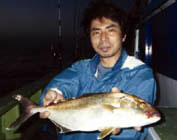Making Sushi and the Purpose of Conducting Biological Research
"If I were ever to stop being a researcher, I sometimes think that running a sushi-shop would be a great way to make a living."
We spent some time with Dr. Kimura, a Research Scientist in the Laboratory for Brain-Operative Expression, who was kind enough to share his thoughts about sushi, science, philosophy and artificial intelligence.
He went on to say, "Day after day, all day long, I am engaged in research here in the laboratory, which means that often I have fewer opportunities to meet and talk with people outside the Institute. Being here all the time, I sometimes experience a feeling that my research activities here are of little use to anybody. Indeed, there are moments when I feel I am loosing my sense of fulfillment and it can be very unsettling. Sushi-artisans, however, work in the presence of customers and are able to see with their own eyes if customers are really enjoying their sushi. Having this direct connection with end user makes me feel that running a sushi-shop would be a nice choice."
Dr. Kimura, you have always been very conscious of the relationship between his research activities and society. Can the two always be connected?
"Whatever the research is concerned with, it is always connected to society in some way. In some areas of research, the connections are more easily recognized. Medicine, for example, is deeply involved in human life and is something that can be easily understood in a basic sense, which makes it easier for researchers in this area to feel that they are in touch with society. Many researchers that I have met who are doing medical research seem to be filled with a certain "power for good" because of this connection. In other areas of research, though, it may take a closer look to understand the connection. But this does not mean a "power for good" cannot exist."
But can a more fundamental or basic biological approach, one focusing on animals and plants, really help to understand human beings?
"Such an approach is of course possible, but the point is that I am not carrying out research on plants and animals by using them simply as substitutes for human beings."
But if the purpose of the study of structures and mechanisms of other living creatures does not directly concern itself with the human body and its activities, how and where is biological science connected with society in general? "I believe that the connection to society is achieved not simply by having everyone understand the direct end benefits of the research, but through generating research results that can be presented to society on the basis of one's own personal beliefs. For example, in Germany, it is stipulated by law that when a river is repaired, care should be taken so that the river does not flow straight even though it might be the most efficient. The reason is that research has shown that while straight rivers are "efficient", they are not necessarily the best for the environment. Giving priority to the environment rather than to efficiency is a form of philosophy for society and could only be brought by someone taking the time to understand how the ecosystem works and making this type of research a priority."
The Human Brain and Artificial Intelligence
Do you mean to say that the research objective of biologists, for example, is not to know about animals and plants but to lead society in a certain direction based on their observations? If so, isn't their research detached from natural science and isn't such an attitude rather dangerous?
"I believe that the role of researchers is to 'present problems' to society and then leave it up to them to decide if the problems brought forward are to be taken up and what kinds of answers should be sought for problems presented. And researchers should not only be concerned simply with presenting new information, but an appropriate framework and data for evaluating the information presented. In this way, researchers can give back to society in accordance with their own underlying philosophies. "What about major influences in your career? Have these experiences affected how you approach science?
"After receiving my degree, I worked ten years for a research institute at an electronics company. Since the institute was attached to a private enterprise, all of the research activity was focused on returning in some way the research results to society. My position at that time was concerned with research product development. What I tried to accomplish there was nothing but a creation of purpose for the actual development of the end product. The experiences there allowed me to recognize how creating purpose with research is critical in developing a connection with society."
Dr. Kimura went on to talk about the importance of creating purpose, which is one of the key information processing features of the brain. With the idea of eventually "creating a brain", he is conducting research founded on theories about how the creation of purpose is derived and integrated within the brain. Taking these features into consideration may be especially appropriate from the standpoint of biological research concerning artificial intelligence.
At the Institute, he continues to stick to his belief that the primary role of researchers is to return knowledge to society. He is fully aware of the difficulty of persevering in this belief, but continues to believe in his "power for good". His energy and enthusiasm in his present research are no doubt a result of his personal belief in his own work and how it can present new issues to society. In the end, the ideals that he aspires to in his life as a researcher may not be that far from the ideals aspired to in the art of making sushi.






